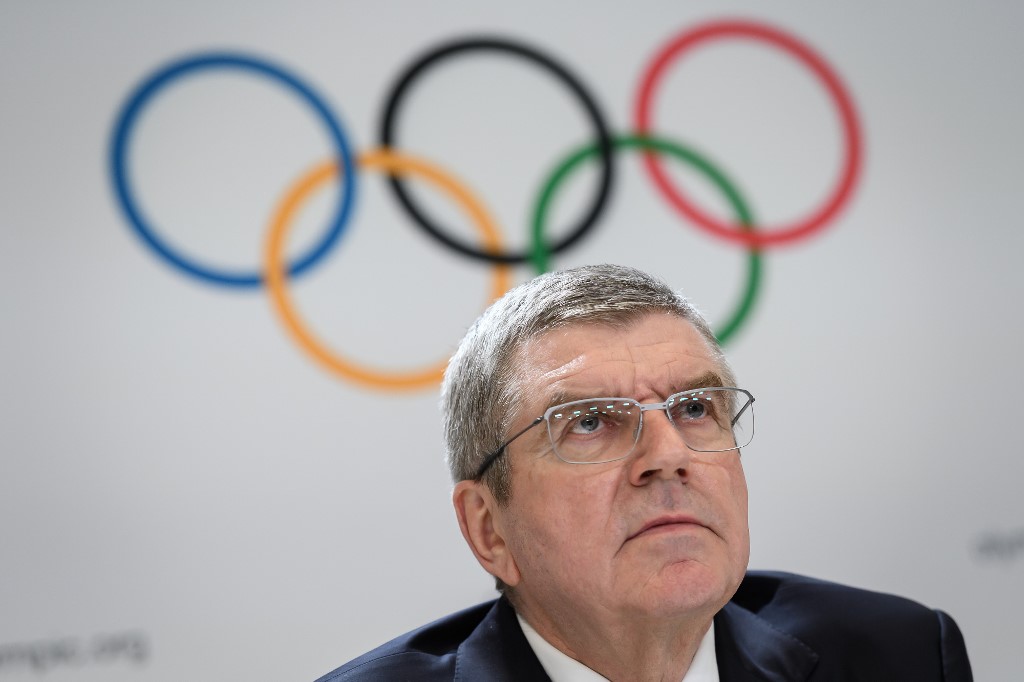
(FILES) In this file photo taken on January 10, 2020, the International Olympic Committee (IOC) President Thomas Bach attends a press conference in Lausanne. – Bach will stand unopposed to serve a second term as International Olympic Committee president, the body said on December 1, 2020. (Photo by Fabrice COFFRINI / AFP)
Thomas Bach will be re-elected unopposed for a second term as Olympic chief this week, just five months before the opening ceremony of the coronavirus-delayed Tokyo Games and less than a year from the increasingly scrutinized 2022 Beijing Winter Olympics.
The 67-year-old German’s second mandate as president of the International Olympic Committee promises to be as eventful, or turbulent, as his first.
The most pressing agenda item at the start of his new four-year term, after an opening eight years that saw him deal with, among other things, the problem-laden 2014 Sochi and 2016 Rio Games, state-sponsored Russian doping and the deadly wave of coronavirus, is the Tokyo Olympics.
The IOC took the decision to postpone the 2020 Games for a year to July 23-August 8 during the COVID-19 pandemic.
The question is now how they will go ahead.
Bach, who won Olympic fencing gold for West Germany in the team foil in 1976 and has been an International Olympic Committee member since 1991, should have been reinstalled as IOC president in the Greek capital Athens which was the site of the first Modern Olympics in 1896.
But the COVID-19 pandemic quickly put paid to that.
The 137th IOC Session will instead take place with Bach at Lausanne headquarters and members connecting through video-conferencing from Wednesday to Friday, with the executive board meeting Monday seen as preparation for the main event.
Before reinstalling Bach, the executive board is scheduled to receive updates on the activities of the IOC administration and reports from the Organising Committees for the upcoming Olympic Games.
Among them will be the “Agenda 2020”, which has sought to streamline the candidacy process for bidding Olympic cities in a bid to cut costs.
It saw Paris granted the 2024 Olympics and Los Angeles the 2028 Games back in 2017, and the IOC last month accorded preferred candidate status accorded to Brisbane for 2032.
What most eyes will be on, however, is Tokyo. There still lies a degree of unpredictability.
Cancelation of the Tokyo Games is not out of the realm of imagination despite the race to contain the coronavirus and press ahead with a Games contained in a bio-secure bubble.
Bach has been at pains to reiterate that the IOC remains committed to holding a “successful and safe” Tokyo Games this year, dismissing cancellation talk as “speculation”.
Overseas spectators, however, are likely to be shut out, Japanese media reported last week after organizers said that public safety would be the “top priority” at the Games.
The Japanese government, Tokyo metropolitan government and Tokyo 2020 organizing committee are leaning towards holding the massive event in front of a domestic audience only, the Yomiuri Shimbun and other outlets said.
Officials fear that an influx of visitors from abroad will endanger the Japanese public, with Tokyo currently under a COVID-19 state of emergency that limits capacity at sporting events to 5,000.
Columnist David Owen of the respected insidethegames.biz website called Bach “an unlucky president” of the IOC.
“It is sobering to reflect that, having completed a full term, he has still to preside over a truly unblemished Games – and given the darkening political shadows hanging over Beijing, Paris 2024 might represent his final chance to do so,” Owen said in reference to threats to boycott the 2022 Winter Games over alleged human rights abuses by the Chinese government.